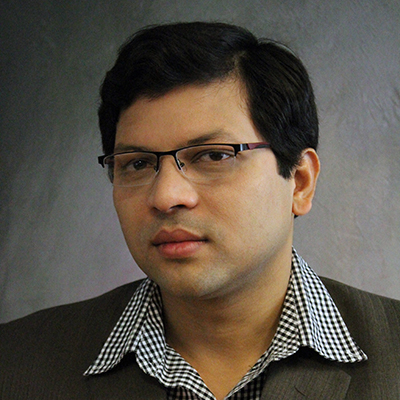Professor Shreyas Sen wins AFOSR Young Investigator Award to work on Human Body Communication
ECE Assistant Professor Shreyas Sen is among 58 scientists and engineers to share $20.8 million in grants awarded by the Air Force Office of Scientific Research (AFOSR). Professor Sen received the Young Investigator Research Program (YIP) Award 2017 to work on Human Body Communication (HBC), which focuses on using the human body as a conducting medium to securely, safely, and energy-efficiently connect wearable and implantable devices and sensors.
“I am extremely excited to receive this award as it will allow us to perform state-of-the-art experimentation to develop the basic science of HBC,” said Professor Sen, who directs the SPARC Lab at ECE. “With the proliferation of energy-efficient miniaturized sensors and computing elements, the human body is a prominent emerging frontier for connected computing. We plan to use the conductive properties of the body itself to securely connect these on-body or in-body sensors and devices. Through this grant, we hope to establish critical scientific understanding of HBC that will be used for Remote Health Monitoring and many other emerging applications.”
The YIP is open to scientists and engineers at research institutions across the United States who received Ph.D. or equivalent degrees in the last five years and who show exceptional ability and promise for conducting basic research. The objective of this program is to foster creative basic research in science and engineering, enhance early career development of outstanding young investigators, and increase opportunities for the young investigators to recognize the Air Force mission and the related challenges in science and engineering. This year AFOSR received 230 proposals in response to its solicitation in areas such as aerospace, chemical and material sciences; physics and electronics; and mathematics, information and life sciences.
Professor Sen joined the ECE department in January 2016, prior to which he was a Research Scientist at Intel Labs, since his Ph.D. in 2011 from Georgia Tech. At Intel, he developed the world’s fastest mm-scale Capacitive Proximity Communication and contributed to the USB-C type specification. At Georgia Tech, Sen worked on the first Self-Learning Channel-Adaptive Radio. His current research interests include sensing and communication circuits/systems for Internet of Things (IoT), Biomedical and Security. He has authored/co-authored 2 book chapters, over 85 journal and conference papers and has 11 patents granted/pending. Dr. Sen is a recipient of the Intel Labs Divisional Recognition Award 2014 for industrywide impact on USB-C type, Intel Corporation PhD Fellowship 2010-11, IEEE Microwave Theory and Technique Society (IEEE MTT-S) Graduate Fellowship Award 2008, UC Berkeley GSRC Margarida Jacome Best Research Award 2007, IEEE ICCAD Best-in-Track Award 2014, IEEE VTS Honorable Mention Award 2014, Intel Labs Quality Award 2012, Best Paper Award (Silver) in IEEE MTT-S RWS 2008, SRC Inventor Recognition Award 2008 and IISC Young Engineering Fellowship in 2005. He serves/has served as an Associate Editor of IEEE Design & Test, Publicity Chair in ETS, Organizer in DAC, ITC, IEEE Sensors and Program Committee member of DATE, ITC, VLSI Design and VDAT.

